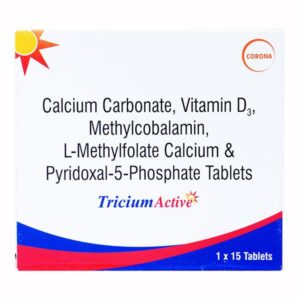CALCIUM CARBONATE + VITAMIN D3 (CHOLECALCIFEROL) + BACILLUS CLAUSII
Calcium Carbonate: Calcium Carbonate is a medication classified as an antacid and a dietary supplement. It is commonly used to relieve symptoms associated with heartburn, indigestion, and acid reflux. Calcium Carbonate works by neutralizing excess stomach acid, which helps to alleviate symptoms and provide relief.
The recommended dose of Calcium Carbonate varies depending on the specific condition being treated. For heartburn or indigestion, adults can take 500 to 1500 mg of calcium carbonate, usually with meals and at bedtime. However, it is important to follow the instructions provided by a healthcare professional or as indicated on the packaging.
Like any medication, Calcium Carbonate may have side effects. Common side effects include constipation, flatulence, and belching. These side effects are usually mild and temporary. In rare cases, high doses of calcium carbonate may lead to a condition called milk-alkali syndrome, characterized by symptoms like nausea, vomiting, headache, loss of appetite, and increased urination. It is crucial to consult a healthcare professional if any severe side effects occur.
Calcium Carbonate should be used with caution in individuals with certain medical conditions, such as kidney disease or kidney stones, as it can increase the risk of developing these conditions. Additionally, it is important to note that Calcium Carbonate may interact with certain medications, including antibiotics, iron supplements, and certain heart medications. Therefore, it is essential to consult a healthcare professional or pharmacist before using Calcium Carbonate if taking any other medications.
In conclusion, Calcium Carbonate is an antacid and dietary supplement used to treat symptoms of heartburn, indigestion, and acid reflux. It works by neutralizing stomach acid. The dose varies depending on the condition being treated, and side effects are generally mild and temporary. However, caution should be exercised in individuals with certain medical conditions or when taking other medications. It is always advisable to consult a healthcare professional or pharmacist before using Calcium Carbonate.
Vitamin D3 (cholecalciferol): Vitamin D3, also known as cholecalciferol, is a fat-soluble vitamin that is naturally produced in the skin when exposed to sunlight. It can also be obtained through certain foods and supplements.
Vitamin D3 is primarily used to treat and prevent vitamin D deficiency, as well as to support the absorption and utilization of calcium and phosphorus in the body. It plays a crucial role in maintaining healthy bones and teeth, supporting immune function, and regulating cell growth and differentiation.
Mechanism of action: Once absorbed into the bloodstream, vitamin D3 is converted into an active form known as calcitriol in the kidneys. Calcitriol then binds to vitamin D receptors (VDRs) in various target tissues, including the intestine, bones, and immune cells. Activation of VDRs regulates the expression of genes involved in calcium and phosphorus absorption, bone metabolism, and immune response.
The recommended daily intake of vitamin D3 varies depending on age, sex, and health conditions. For adults, a typical daily dose ranges from 400 to 2000 international units (IU). Higher doses may be prescribed for individuals with severe deficiency or certain medical conditions, under the guidance of a healthcare professional.
When taken at appropriate doses, Vitamin D3 is generally considered safe and well-tolerated. However, excessive intake can lead to vitamin D toxicity, which may cause symptoms such as nausea, vomiting, loss of appetite, excessive thirst, constipation, weakness, and confusion. Long-term excessive intake of vitamin D can also result in hypercalcemia (high levels of calcium in the blood), which can lead to kidney damage and bone loss.
It is important to consult with a healthcare professional or a registered dietitian before starting vitamin D3 supplementation to determine the appropriate dose and to monitor vitamin D levels in the blood. Additionally, individuals with certain conditions such as hypercalcemia, vitamin D hypersensitivity, or kidney disease should use vitamin D3 with caution and under medical supervision.
Bacillus Clausii: Bacillus Clausii is a probiotic drug used for the treatment of gastrointestinal disorders. It contains a strain of Bacillus Clausii, which is a spore-forming bacteria found naturally in the human gut.
The mechanism of action of Bacillus Clausii is multifaceted. It exerts its beneficial effects by various means such as antimicrobial activity, competition for nutrients with pathogenic bacteria, and modulation of the immune system. It helps restore the natural balance of gut flora and promotes the growth of beneficial bacteria while suppressing the growth of harmful bacteria.
The recommended dose of Bacillus Clausii may vary depending on the specific condition being treated and the age of the patient. It is available in oral suspension or capsule forms. The usual dose is 2-4 billion spores per day for adults and 1-2 billion spores per day for children. It should be taken with or without food as directed by a healthcare professional.
Overall, Bacillus Clausii is considered to be a safe drug with minimal side effects. Commonly reported side effects include mild gastrointestinal symptoms such as bloating, flatulence, and diarrhea. These side effects are usually temporary and resolve on their own.
However, in very rare cases, severe allergic reactions may occur. If any serious side effects or allergic reactions are experienced, it is important to seek immediate medical attention.
It is worth noting that Bacillus Clausii is generally well-tolerated, but it may interact with certain medications. Therefore, it is essential to inform your healthcare provider about any other drugs or supplements you are taking before starting Bacillus Clausii to prevent any potential interactions.

